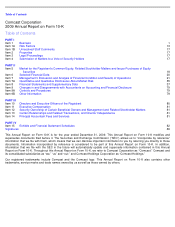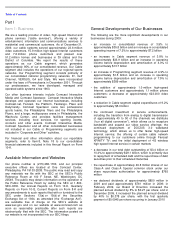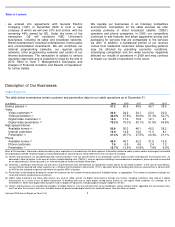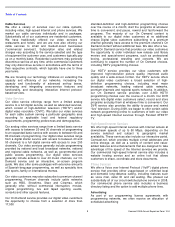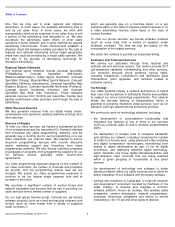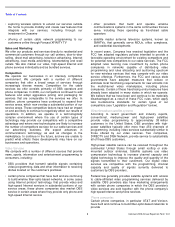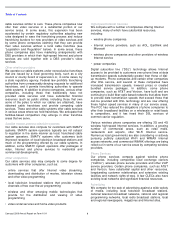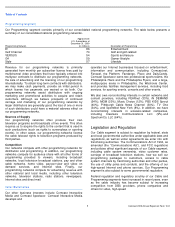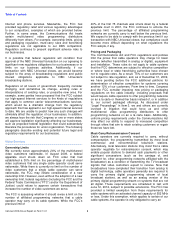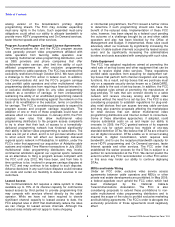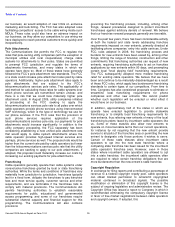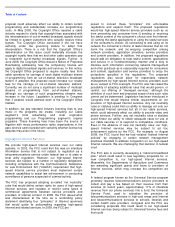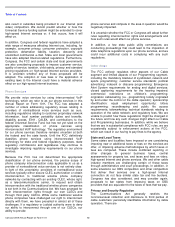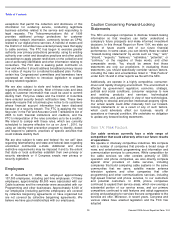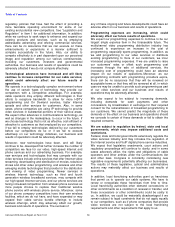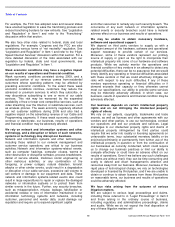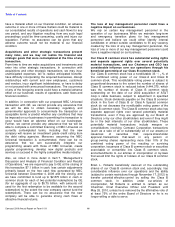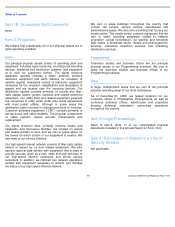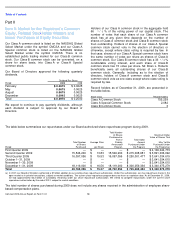Comcast 2009 Annual Report Download - page 14
Download and view the complete annual report
Please find page 14 of the 2009 Comcast annual report below. You can navigate through the pages in the report by either clicking on the pages listed below, or by using the keyword search tool below to find specific information within the annual report.
Table of Contents
9
Comcast 2009 Annual Report on Form 10-
K
analog version of the broadcaster’s primary digital
programming stream. The FCC may consider expanding
must-carry rights in the future. Such expanded must-carry
obligations could affect our ability to allocate bandwidth to
provide more HDTV programming and On Demand services,
faster Internet speeds and other services.
Program Access/Program Carriage/License Agreements
The Communications Act and the FCC’s program access
rules generally prevent video programmers affiliated with
cable operators from favoring cable operators over
competing multichannel video programming distributors, such
as DBS providers and phone companies that offer
multichannel video services, and limit the ability of such
affiliated programmers to offer exclusive programming
arrangements to cable operators. The FCC has extended the
exclusivity restrictions through October 2012. We have joined
a challenge to this FCC action in federal court. In addition,
the Communications Act and the FCC’s program carriage
rules prohibit cable operators and other multichannel video
programming distributors from requiring a financial interest in,
or exclusive distribution rights for, any video programming
network as a condition of carriage, or from unreasonably
restraining the ability of an unaffiliated programming network
to compete fairly by discriminating against the network on the
basis of its nonaffiliation in the selection, terms or conditions
for carriage. The FCC is considering proposals to expand its
program access and program carriage regulations. The
adoption of one or more of these proposals could have an
adverse effect on our businesses. In January 2010, the FCC
adopted new rules that allow multichannel video
programming distributors to file program access complaints
to try to show that their lack of access to a terrestrially-
delivered programming network has hindered significantly
their ability to deliver video programming to subscribers. The
rules are not yet in effect, and it is not yet clear whether and
to what extent this will affect our terrestrially delivered
regional sports network in Philadelphia. In addition, under the
FCC’s order that approved our acquisition of Adelphia cable
systems and related Time Warner transactions in July 2006,
multichannel video programming distributors may invoke
commercial arbitration against our regional sports networks
as an alternative to filing a program access complaint with
the FCC until July 2012. We have been, and from time to
time continue to be, involved in program carriage disputes at
the FCC and may continue to be subject to such disputes.
Adverse decisions in any such future disputes could increase
our costs and curtail our flexibility to deliver services to our
customers.
Leased Access
The Communications Act requires a cable system to make
available up to 15% of its channel capacity for commercial
leased access by third parties to provide programming that
may compete with services offered directly by the cable
operator. While we have not been required to devote
significant channel capacity to leased access to date, the
FCC adopted rules in 2007 that dramatically reduce the rates
we can charge for leased access channels. Although the
reduced rates initially will not apply to home shopping
or infomercial programmers, the FCC issued a further notice
to determine if such programming should also have the
benefit of the reduced rates. Implementation of these FCC
rules, however, has been stayed by a federal court pending
the outcome of a challenge brought by us and other cable
operators and also has been blocked by the Office of
Management and Budget. If implemented, these rules could
adversely affect our business by significantly increasing the
number of cable system channels occupied by leased access
users and by significantly increasing the administrative
burdens and costs associated with complying with such rules.
Cable Equipment
The FCC has adopted regulations aimed at promoting the
retail sale of set-top boxes and other equipment that can be
used to receive digital video services. These regulations
prohibit cable operators from acquiring for deployment set-
top boxes that perform both channel navigation and security
functions. As a result, set-top boxes that we purchase must
rely on a separate security device known as a CableCARD,
which adds to the cost of set
-top boxes. In addition, the FCC
has adopted rules aimed at promoting the manufacture of
plug-and-play TV sets that can connect directly to a cable
network and receive one-way analog and digital video
services without the need for a set-top box. The FCC is also
considering proposals to establish regulations for plug-and-
play retail devices that can access two-way cable services
and may also examine proposals affecting the marketplace
for retail devices that can deliver multichannel video
programming distributors and Internet content to consumers.
Some of these alternative approaches, if adopted, could
impose substantial costs on us and impair our ability to
innovate. In 2009, the FCC granted waivers of its separate
security rule for certain set-top box models of one-way
standard-definition DTAs. We believe that DTAs are critical to
our all digital conversion. DTAs enable us to convert analog
channels to digital transmission, which requires less
bandwidth, and to use the recaptured bandwidth capacity for
more HDTV programming and On Demand services, faster
Internet speeds and other services. The FCC order that
established the waiver process for the DTAs is subject to a
petition for reconsideration at the FCC. We cannot predict the
extent to which any FCC reconsideration or other FCC action
in this area may hinder our ability to continue deploying
DTAs.
MDUs and Inside Wiring
Under an FCC order, exclusive video service access
agreements between cable operators and MDUs or other
private real estate developments are prohibited. In May 2009,
a federal appellate court upheld the FCC order, which had
been challenged by the National Cable &
Telecommunications Association. The FCC is also
considering proposals to extend these prohibitions to non-
cable multichannel video programming distributors and to
expand the scope of the rules to prohibit exclusive marketing
and bulk billing agreements. The FCC’s order to abrogate the
exclusivity provisions of those agreements could negatively
affect


